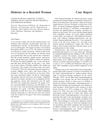 8 citations,
July 2014 in “General and Comparative Endocrinology”
8 citations,
July 2014 in “General and Comparative Endocrinology” Finasteride affects frog testes by increasing testosterone, decreasing 5α-DHT, and impacting genes related to reproduction and other functions.
 8 citations,
January 1991 in “European Urology”
8 citations,
January 1991 in “European Urology” Finasteride lowers DHT levels and raises testosterone in a dose-dependent way.
 8 citations,
January 1986 in “Journal of hepatology”
8 citations,
January 1986 in “Journal of hepatology” Men with liver cancer have higher levels of a specific testosterone byproduct in their liver and blood, despite overall lower male hormone levels.
 7 citations,
May 2019 in “British Journal of Dermatology”
7 citations,
May 2019 in “British Journal of Dermatology” Transgender and nonbinary individuals experience hair loss, with transmen on testosterone seeing more severe hair loss, while feminizing hormones may stabilize hair loss in transwomen.
7 citations,
April 2011 in “American journal of obstetrics and gynecology” A woman's virilization symptoms were caused by her partner's use of testosterone cream, which resolved after they separated.
 7 citations,
July 1995 in “PubMed”
7 citations,
July 1995 in “PubMed” Finasteride, a drug that changes testosterone to a different hormone, was studied and its effects over time were modeled successfully.
 6 citations,
August 2020 in “JCRPE”
6 citations,
August 2020 in “JCRPE” A boy with a rare form of early puberty caused by a new gene mutation responded well to treatment aimed at reducing testosterone and preserving adult height.
6 citations,
November 2018 in “Journal of molecular histology” Testosterone increases fluid secretion and aquaporin expression in the vas deferens, which is important for male fertility.
 6 citations,
December 2015 in “JAMA”
6 citations,
December 2015 in “JAMA” The woman's high testosterone levels indicated PCOS, leading to treatment that improved her symptoms.
 6 citations,
August 2014 in “Sri Lanka Journal of Diabetes Endocrinology and Metabolism”
6 citations,
August 2014 in “Sri Lanka Journal of Diabetes Endocrinology and Metabolism” The FG score is better at detecting hyperandrogenism in PCOS patients than testosterone levels or FAI, but testosterone is the recommended test for diagnosis.
 6 citations,
December 2010 in “Case Reports”
6 citations,
December 2010 in “Case Reports” A woman with high testosterone and an adrenal nodule had an ovarian tumor causing her symptoms, which improved after the tumor was removed.
 6 citations,
September 1998 in “The Journal of The British Menopause Society”
6 citations,
September 1998 in “The Journal of The British Menopause Society” Testosterone replacement may help postmenopausal women with sexual function and bone density, but suitable treatments are limited.
 5 citations,
December 2021 in “Physiological Research”
5 citations,
December 2021 in “Physiological Research” Men, particularly those with hair loss, are more likely to get the virus, and those with prostate cancer may have milder symptoms. Testosterone's role in the disease is unclear, and the virus doesn't seem to harm male fertility. Women with PCOS might be at higher risk. More research is needed.
 5 citations,
January 2017 in “Endocrinology”
5 citations,
January 2017 in “Endocrinology” Genetic defects in testosterone production can cause hormonal and developmental disorders, and more research is needed to understand androgen regulation and develop safer treatments.
 5 citations,
January 2016 in “Asian pacific Journal of Tropical Biomedicine”
5 citations,
January 2016 in “Asian pacific Journal of Tropical Biomedicine” Phthirusa pyrifolia extract may lower testosterone and harm male rat reproduction without damaging the liver or kidneys.
 5 citations,
January 1984 in “Journal of psychosomatic obstetrics and gynecology/Journal of psychosomatic obstetrics and gynaecology”
5 citations,
January 1984 in “Journal of psychosomatic obstetrics and gynecology/Journal of psychosomatic obstetrics and gynaecology” The treatment reduced hair growth and testosterone in women with excess hair and had some effects on stress responses.
 4 citations,
November 2021 in “Pharmaceuticals”
4 citations,
November 2021 in “Pharmaceuticals” Paeonia lactiflora and Poria cocos extracts can potentially increase hair growth and reduce hair loss symptoms by lowering testosterone and inflammation levels.
 4 citations,
May 2019 in “Physiology & Behavior”
4 citations,
May 2019 in “Physiology & Behavior” Cocaine impairs male sexual behavior and alters testosterone metabolism in the brain.
 4 citations,
November 2018 in “Endocrinology, Diabetes & Metabolism Case Reports”
4 citations,
November 2018 in “Endocrinology, Diabetes & Metabolism Case Reports” GnRH analogue can help diagnose ovarian causes of high testosterone in postmenopausal women when scans don't show the cause.
4 citations,
January 2018 in “JBRA assisted reproduction” Orlistat helped reduce weight and testosterone in obese women with PCOS but did not significantly affect other androgens or cholesterol levels.
 4 citations,
November 2015 in “Journal of Investigative Dermatology”
4 citations,
November 2015 in “Journal of Investigative Dermatology” Testosterone may worsen hair loss by affecting hair growth signals, while different prostaglandins can either hinder or promote hair growth.
4 citations,
July 2006 in “British journal of dermatology/British journal of dermatology, Supplement” Testosterone increases hair follicle cell growth when beard or axillary skin cells are present together.
 4 citations,
June 2005 in “Andrology”
4 citations,
June 2005 in “Andrology” A woman's diabetes improved after removing ovarian tumors that caused high testosterone levels.
 4 citations,
February 1995 in “Journal of Clinical Dermatology”
4 citations,
February 1995 in “Journal of Clinical Dermatology” More men than women have hair loss, it's often inherited, and it's linked with higher testosterone levels. There's been a rise in female hair loss patients.
 3 citations,
February 2018 in “Human Reproduction”
3 citations,
February 2018 in “Human Reproduction” A man with testotoxicosis was fertile despite low FSH levels, suggesting high testosterone may allow sperm production without FSH.
 3 citations,
October 2004 in “International journal of gynaecology and obstetrics”
3 citations,
October 2004 in “International journal of gynaecology and obstetrics” Finasteride doesn't change polycystic ovary size or cyst number, suggesting testosterone's role in their appearance.
 3 citations,
October 1995 in “International Journal of Dermatology”
3 citations,
October 1995 in “International Journal of Dermatology” Finasteride helps treat skin issues like acne and baldness by blocking testosterone conversion.
 2 citations,
February 2023 in “BMC endocrine disorders”
2 citations,
February 2023 in “BMC endocrine disorders” Curcumin improved some metabolic factors in women with PCOS but did not affect cholesterol, insulin, or testosterone levels.
 2 citations,
February 2021 in “Brain Research”
2 citations,
February 2021 in “Brain Research” Testosterone affects blood pressure control and inflammation in male rats with endotoxic shock, and blocking certain hormones may help treat it.
 2 citations,
January 2014 in “Elsevier eBooks”
2 citations,
January 2014 in “Elsevier eBooks” The document explains how sperm cells are produced, the role of testosterone in this process, and how toxins can reduce sperm count and fertility.


























